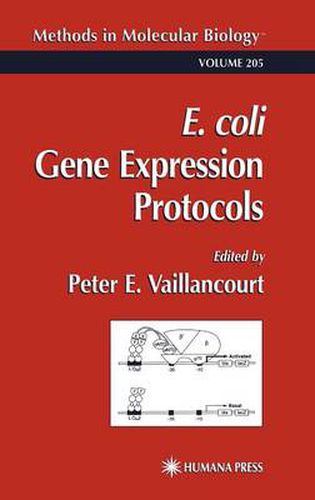Readings Newsletter
Become a Readings Member to make your shopping experience even easier.
Sign in or sign up for free!
You’re not far away from qualifying for FREE standard shipping within Australia
You’ve qualified for FREE standard shipping within Australia
The cart is loading…






This title is printed to order. This book may have been self-published. If so, we cannot guarantee the quality of the content. In the main most books will have gone through the editing process however some may not. We therefore suggest that you be aware of this before ordering this book. If in doubt check either the author or publisher’s details as we are unable to accept any returns unless they are faulty. Please contact us if you have any questions.
In E. coli Gene Expression Protocol s, Peter E. Vaillancourt, explores the most popular and newly emerging methodologies to exploit the advantages of using E. coli as a host organism for expressing recombinant proteins. The subject matter in this text is displayed in two categories: 1) the use of E. coli vectors and strains for production of pure, functional protein, and 2) the use of E. coli as host for the functional screening of large collections of proteins or peptides. Clear, concise protocols for state-of-the-art techniques relevant to this rapidly emerging field are provided with step-by-step insturctions. This volume will serve as a vehicle to facilitate the widespread use of these improved techniques, and thereby contribute to the rapid advancement of the field. Not only does the text explore in great detail revolutionary findings in protein expression, protein purification, gene discovery, proteomics and protein-protein interactions, it also gives insight to expression vectors, expression strains, phage displays, and two-hybrid systems. These methods and protocols will be of use to researchers over a wide range of disciplines as well as pharmacologists involved in clinical trials, students and practicing physicians. The text will serve as an invaluable reference to academic and industrial biochemists, molecular and cell biologists whose research requires the physical analysis of purified cloned proteins. Scientists interested in new systems for the discovery of interacting proteins and peptides will come to treasure the extensive knowledge contained in this book, and how it will assist them in their research.
$9.00 standard shipping within Australia
FREE standard shipping within Australia for orders over $100.00
Express & International shipping calculated at checkout
This title is printed to order. This book may have been self-published. If so, we cannot guarantee the quality of the content. In the main most books will have gone through the editing process however some may not. We therefore suggest that you be aware of this before ordering this book. If in doubt check either the author or publisher’s details as we are unable to accept any returns unless they are faulty. Please contact us if you have any questions.
In E. coli Gene Expression Protocol s, Peter E. Vaillancourt, explores the most popular and newly emerging methodologies to exploit the advantages of using E. coli as a host organism for expressing recombinant proteins. The subject matter in this text is displayed in two categories: 1) the use of E. coli vectors and strains for production of pure, functional protein, and 2) the use of E. coli as host for the functional screening of large collections of proteins or peptides. Clear, concise protocols for state-of-the-art techniques relevant to this rapidly emerging field are provided with step-by-step insturctions. This volume will serve as a vehicle to facilitate the widespread use of these improved techniques, and thereby contribute to the rapid advancement of the field. Not only does the text explore in great detail revolutionary findings in protein expression, protein purification, gene discovery, proteomics and protein-protein interactions, it also gives insight to expression vectors, expression strains, phage displays, and two-hybrid systems. These methods and protocols will be of use to researchers over a wide range of disciplines as well as pharmacologists involved in clinical trials, students and practicing physicians. The text will serve as an invaluable reference to academic and industrial biochemists, molecular and cell biologists whose research requires the physical analysis of purified cloned proteins. Scientists interested in new systems for the discovery of interacting proteins and peptides will come to treasure the extensive knowledge contained in this book, and how it will assist them in their research.